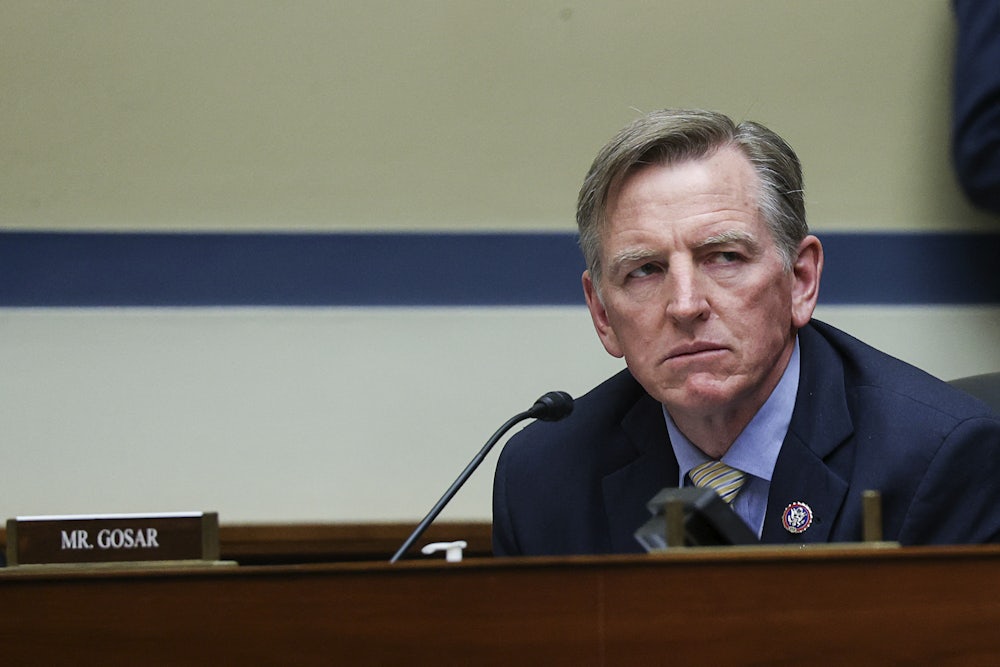If historians of the future are forced to record this country’s descent into tyranny, they’ll be required to sift through the grim record and identify a few decisive moments when the tide turned. Here’s a hint for you, historians of the future: Take note of Tuesday, November 9.
That’s the date when nutcase Congressman Paul Gosar posted that hideous tweet about Alexandria Ocasio-Cortez. Ten House Democrats signed a statement seeking to censure Gosar (interestingly, the 10 include AOC’s fellow Squadders Ayanna Pressley and Rashida Tlaib but not Ilhan Omar). That’s fine, I guess, but Gosar should obviously be expelled. If Kevin McCarthy had any decency, he’d take charge and lead the effort.
But he doesn’t, and he won’t, and nothing will happen to Gosar. He represents rural Western Arizona, and the district has a Cook rating of R+22, meaning that a Democrat is roughly as likely to win there as a Republican is to become mayor of San Francisco.
Donald Trump has been out of office for almost a year now, but in that time, Republicans have somehow contrived to go even more batshit than they ever were while under the former president’s influence. There are no limits. They say, “Let’s go, Brandon” on the floor of the House of Representatives, which once upon a time was a place of such insistent decorum that it was against the rules to criticize a member by name. They exist in a universe that is … well, I was going to say parallel to the rational world, but it’s not—it’s more like it’s perpendicular. This GOP inhabits a dark and lawless place filled with “facts” that aren’t true and with nothing but ratification and reward for outrageous behavior.
About 40, maybe even 45 percent of America is with them all the way and even loves what Gosar did. I get that. But here’s what I don’t get. Assuming that we have about the same number of people on our side, that leaves about 10 percent, maybe a little more, somewhere in the middle. Why can’t these people see that the Republican Party has gone insane?
Again, I get it—if you’re a Republican, your priors are set. You may have found Trump occasionally embarrassing, but you’re conservative, and you think liberals are destroying the country and all the rest. Fine. But what about these swing voters? I have two theories, and an idea.
Theory number one is that these people in the middle decided a long time ago, when they were teens or young adults, that the two parties were about the same—mirror images of each other. That’s what we’re taught in school, after all, or were in my day. And it was true in a lot of ways back then. The two political parties of the United States, for reasons relating to history and geography, were large and ideologically diverse. In more recent decades, that’s changed, but I know of no study from political science that supports the contention that they’ve both gone off to similar extremes. Political science says clearly what daily evidence tells us: The Democrats have moved somewhat left, and Republicans have zoomed so far to the right that they’re now openly opposing democracy. The divergence has been far from even—not even close.
But people in the middle seem to be somehow psychologically or even emotionally committed to the belief that the parties are the same. I often wonder what the Republicans will have to do before these people say, “Oh, wow. The Republicans really are different.” Stealing the presidential election, which Donald Trump will most certainly do if he runs in 2024 and loses narrowly enough that he can get away with it? Jailing political opponents, which is also not crazy to think Trump might do as president?
To be honest, I doubt those two hypotheticals are dramatic enough. It’ll probably have to be something visual, something that looks ominous on TV. Massive book burnings, maybe? I think that makes decent people nervous; carries a whiff of Nazi Germany about it. But I’m not sure of anything anymore.
The second theory is just that people have become overwhelmingly cynical about all things political. They believe the halls of power are lined with liars and crooks. This isn’t really the case, of course. Politicians spin as easily as breathing, but most don’t tell outright lies on a regular basis—although this is far less true of Republicans than it once was, because so much of their agenda now is predicated on falsehoods like “voter fraud.” There aren’t a lot of literal crooks in Congress either, but there’s enough outside money sluicing through the system—and having an outsize influence on the policy debate—for people to draw cynical conclusions. Many think politicians are just in it for themselves, and even though they’re a minority, too many politicians confirm this premise.
Cynicism, on balance, helps Republicans because they’re the party of cynicism, and of hatred of effective government. Dysfunction anywhere only underscores their worldview; if they committed themselves to sensible rule, they’d only undercut their message. When government screws something up, the people in this middle 10 percent largely blame the party in power—but I suspect that subconsciously, they blame Democrats a little more than Republicans, because Democrats are the ones who insist that government can work for people. They’re the party that says we’re spending taxpayer dollars to make your life easier. They push policy because they believe ideas can help lift up ordinary Americans. Republicans make no commitments beyond a promise that people can keep their guns and forsake vaccine mandates. And the GOP delivers on these pledges, because it’s comparatively easy to do so. It’s fixing the bridges, getting more pocket money into folks’ wallets, and leading a collective response to a pandemic that requires actual hard work.
So these are my theories. My idea of what Democrats need to do to reach that middle 10 percent is that they need to speak frankly about these distinctions. Right now, however, Democrats still seem to want to go through the charade of working across the aisle and looking to the Republicans to join in big compromises to pass bipartisan legislation where both parties can take a win. The infrastructure bill that just passed was bipartisan, and it delivered on this promise, sure. That was great. And the president has to talk this way, because he is after all the president of all the people. But the GOP has turned on the Republicans who helped get the infrastructure bill passed. What kind of future do those few reasonable Republicans really have?
Most of the Democratic senators and House members don’t need to follow the president’s lead in trying to stitch these two increasingly different parties together. Ironically, by doing so they’re just setting themselves up for more perceived failure from this middle 10 percent, because when Democrats say, “I’m determined to reach out to my Republican friends,” and those Republican friends reciprocate by telling the Democrats to go fuck themselves, Democrats only put themselves on the hook for more blame, because they didn’t reach out far enough! They failed to soothe the GOP’s savagery.
This is a tragic situation. It’s like watching a beloved uncle succumb to dementia, but no one is allowed to talk about it—and in fact everyone has to pretend that everything is fine and the uncle is as sharp as ever. Except that uncle is a harmless figure of sympathy, whereas the Republican Party is about to destroy democracy, if given half a chance. Democrats should speak about what’s happening out loud.






